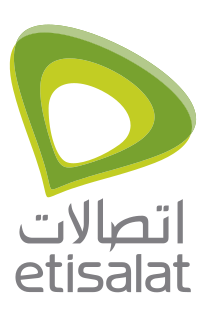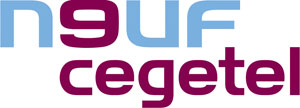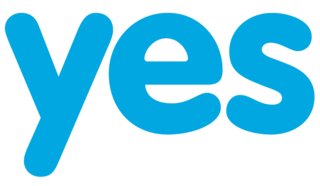The liberalisation of Bangladesh's telecommunications sector began with small steps in 1989 with the issuance of a licence to a private operator for the provision of inter alia cellular mobile services to compete with Bangladesh Telegraph and Telephone Board (BTTB), the previous monopoly provider of telecommunications services within Bangladesh. Significant changes in the number of fixed and mobile services deployed in Bangladesh occurred in the late 1990s and the number of services in operation have subsequently grown exponentially in the past five years.
Voice over Internet Protocol (VoIP), also called IP telephony, is a method and group of technologies for the delivery of voice communications and multimedia sessions over Internet Protocol (IP) networks, such as the Internet. The terms Internet telephony, broadband telephony, and broadband phone service specifically refer to the provisioning of communications services over the public Internet, rather than via the public switched telephone network (PSTN), also known as plain old telephone service (POTS).

Emirates Telecommunication Group Company PJSC,, branded trade name Etisalat, is a multinational Emirati based telecommunications services provider, currently operating in 15 countries across Asia, the Middle East and Africa. As of February 2014, Etisalat is the 14th largest mobile network operator in the world, with a total customer base of more than 167 million. It is the only net provider in UAE. Etisalat was named the most powerful company in the United Arab Emirates by Forbes Middle East in 2012.

A content delivery network, or content distribution network (CDN), is a geographically distributed network of proxy servers and their data centers. The goal is to provide high availability and performance by distributing the service spatially relative to end users. CDNs came into existence in the late 1990s as a means for alleviating the performance bottlenecks of the Internet, even as the Internet was starting to become a mission-critical medium for people and enterprises. Since then, CDNs have grown to serve a large portion of the Internet content today, including web objects, downloadable objects, applications, live streaming media, on-demand streaming media, and social media sites.

Internet Protocol television (IPTV) is the delivery of television content over Internet Protocol (IP) networks. This is in contrast to delivery through traditional terrestrial, satellite, and cable television formats. Unlike downloaded media, IPTV offers the ability to stream the source media continuously. As a result, a client media player can begin playing the content almost immediately. This is known as streaming media.

Bharat Sanchar Nigam Limited, d/b/a BSNL is an Indian state-owned telecommunications company, headquartered in New Delhi, Delhi, India. It was incorporated by Department of Telecommunications, Ministry of Communications, Government of India on 1 October 2000. It provides mobile voice and internet services through its nationwide telecommunications network across India. It is the largest wireline telecommunications network company in India with more than 60% market share and fourth largest wireless telecommunications operator.
The next-generation network (NGN) is a body of key architectural changes in telecommunication core and access networks. The general idea behind the NGN is that one network transports all information and services by encapsulating these into IP packets, similar to those used on the Internet. NGNs are commonly built around the Internet Protocol, and therefore the term all IP is also sometimes used to describe the transformation of formerly telephone-centric networks toward NGN.

In telecommunications, triple play service is a marketing term for the provisioning, over a single broadband connection, of two bandwidth-intensive services, broadband Internet access and television, and the latency-sensitive telephone. Triple play focuses on a supplier convergence rather than solving technical issues or a common standard. However, standards like G.hn might deliver all these services on a common technology.
TE Data S.A.E. is an Internet service provider in Egypt,established in 2001 by Telecom Egypt to act as its data communications and Internet arm. TE Data has 65% of the market share and controls over 70% of the internet bandwidth in Egypt.

Neuf Cegetel was a French wireline telecommunications service provider and a mobile virtual network operator (MVNO). It offered various telecommunications services to consumers, enterprises and wholesale customers, ranking second in the country in annual revenues. It was legally established in 2005 following the completion of the merger between Neuf Telecom and Cegetel. As of June 2008, the company became a wholly owned subsidiary of SFR, and the brand disappeared commercially.
Bahrain has been connected to the internet since 1995, and made it readily available to its citizens. The country's domain suffix is '.bh'. A 2004 study showed a liberal filtering system is used in Bahrain, one which can be easily bypassed, however more recent events have shown more sophisticated and pervasive filtering. In January 2009, Bahrain has started blocking a vastly increased number of sites through the Information Affairs Authority (IAA). The new filtering has had a noticeable impact in internet access speeds for all traffic.
Network Intelligence (NI) is a technology that builds on the concepts and capabilities of Deep Packet Inspection (DPI), Packet Capture and Business Intelligence (BI). It examines, in real time, IP data packets that cross communications networks by identifying the protocols used and extracting packet content and metadata for rapid analysis of data relationships and communications patterns. Also, sometimes referred to as Network Acceleration or piracy.
Tata Communications Limited is an Indian telecommunications company. The company is part of the Tata Group.
An over-the-top (OTT) media service is a streaming media service offered directly to viewers via the Internet. OTT bypasses cable, broadcast, and satellite television platforms, the companies that traditionally act as a controller or distributor of such content. It has also been used to describe no-carrier cellphones, where all communications are charged as data, avoiding monopolistic competition, or apps for phones that transmit data in this manner, including both those that replace other call methods and those that update software.
Kineto Wireless is based in Milpitas, California and provides telco-OTT solutions to the mobile industry. Kineto’s solutions enhance and extend communications services out over IP-based networks, such as the Internet.

Yes 4G is a brand under YTL Communications Sdn Bhd, a communications service provider in Malaysia. Yes is a global front runner in 4G mobile network and the first nationwide converged 4G service that offers mobile Internet, voice and SMS in one simple plan. It is also the first in Malaysia to provide nationwide VoLTE, available for Android VoLTE-supported smartphones.
Timico is an Information Technology Managed Services provider in the United Kingdom.

Gulf Bridge International (GBI) is the Middle East’s first privately owned submarine cable system linking the countries bordering the Persian Gulf on a self-healing ring to each other and onwards to Europe, Africa and Asia. Its main headquarters are located at the Qatar Science & Technology Park in Doha, Qatar.
Access-independent service (AIS) is a service concept in which a service does not depend on guaranteed access network cooperation for service delivery. Telecoms industry analyst Dean Bubley first used the term in a report on Telco-OTT in February 2012.
Telco cloud is a network architecture that combines software-defined networking (SDN), network functions virtualization (NFV), and cloud native technology into a distributed computing network with resources in data centers, edges sites, and public clouds. The term is mostly used for referring to cloud multi-computing in the telecom industry, in particular, with regard to transition of Communications Service Providers (CSPs) using traditional infrastructure networks of vertically integrated proprietary hardware to Digital Service Providers (DSPs) using cloud-based technologies.







